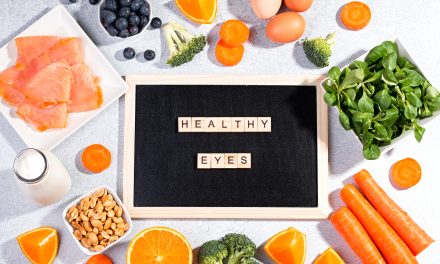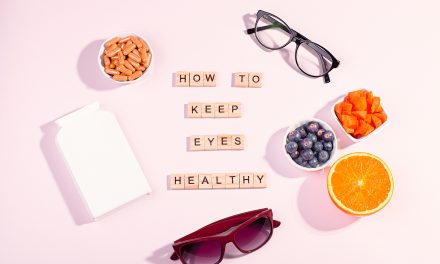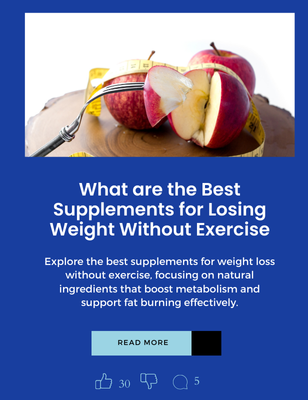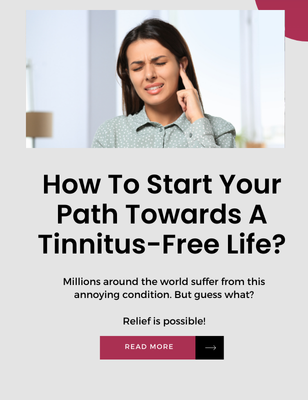Maintaining healthy eyesight is a concern for many, especially in an age where screens are an integral part of daily life. Dietary supplements have gained attention for their potential role in eye health and vision. Specific vitamins and minerals are touted to be particularly beneficial for the eyes, including vitamin A’s essential role in maintaining good vision and reducing the risk of age-related macular degeneration.

The effectiveness of supplements for eye health is grounded in scientific research, including Age-Related Eye Disease Studies (AREDS), highlighting the importance of specific nutrients in eye health. These studies have led to the formulation of eye supplements intended to provide the necessary vitamins and minerals that foster eye health. However, the efficacy of supplements varies, and it’s crucial to understand which nutrients support eye health and under what circumstances supplementation may be beneficial.
Key Takeaways
- Specific vitamins and minerals can support eye health and good vision.
- Scientific studies, such as the AREDS reports, guide the formulation of eye health supplements.
- Supplementation should be considered part of a broader approach to maintaining eye health.
Understanding Eye Health and Vision

Maintaining eye health is pivotal for ensuring clear vision throughout one’s life. Nutrition plays a significant role in eye health; certain eye diseases and conditions can compromise vision. Age also directly impacts eyesight, often leading to age-related macular degeneration (AMD) and cataracts.
Role of Nutrition in Eye Health
Good nutrition is essential for maintaining eye health. Vitamins such as Vitamin A, C, and E and minerals like zinc contribute to the retina’s health and may help ward off conditions such as AMD and cataracts. Antioxidants in various fruits and vegetables can help protect the eyes from oxidative stress. The omega-3 fatty acids in fish support eye health, potentially reducing the risk of dry eye and glaucoma.
Common Eye Diseases and Conditions
Eye diseases can significantly affect vision. Cataracts, which are characterized by clouding of the lens, are a common cause of vision impairment. Glaucoma is another serious condition that can lead to vision loss due to increased pressure within the eye damaging the optic nerve. Additionally, dry eye conditions affect millions and can lead to discomfort and blurred vision. Age-related macular degeneration (AMD) is one of the leading causes of vision loss in older adults, characterized by damage to the macula, the central part of the retina.
The Impact of Age on Eyesight
As people age, their risk of developing eye diseases such as AMD and cataracts increases. After 60, one’s vision often begins to decline, and the need for regular eye examinations becomes more crucial. Nutrients and vitamins that support eye health can become increasingly vital with age to help maintain as much vision quality as possible.
Key Supplements for Eyesight
Numerous supplements can support eye health and potentially protect vision. The following important nutrients have been associated with maintaining good eyesight and reducing the risk of certain eye diseases.
Antioxidants and Eye Health
Antioxidants like lutein and zeaxanthin are critical for eye health. They are found in high concentrations in the macula—a part of the retina responsible for central vision. These substances act as natural sunblock for the eyes and may reduce the risk of macular degeneration. The findings about these antioxidants are supported by research mentioned by Mayo Clinic Press.
Vitamin A and Beta-Carotene
Vitamin A is essential for the production of rhodopsin, a pigment found in the retina that is crucial for night vision. Its precursor, beta-carotene, which gives vegetables like carrots their orange hue, is also beneficial for eye health. A deficiency in vitamin A can lead to night blindness and other vision issues. More details on the role of vitamin A in vision can be found in an article by Healthline.
Omega-3 Fatty Acids
The omega-3 fatty acids EPA and DHA are vital for maintaining cell health in the retina and may play a role in protecting against dry eye syndrome. These fatty acids are prevalent in fish oils and are essential for the normal development and function of cells in the eye. The benefits of omega-3 fatty acids for eye health are detailed further in resources such as Forbes Health.
Essential Vitamins and Their Sources
Maintaining good eyesight requires a diet rich in vitamins and minerals. Each nutrient plays a unique role in supporting eye health, and they are found in various foods, from fruits to nuts.
Vitamin C and E
Vitamin C is crucial for the health of blood vessels in the eyes and could help prevent cataracts. Citrus fruits like oranges and grapefruits are excellent sources. Vitamin E helps protect the eyes from oxidative stress. Almonds and sunflower seeds are rich in vitamin E, making them excellent options for snacking.
B Vitamins for Eye Health
The family of B vitamins, particularly Vitamin B1 or thiamin, supports proper nerve function and is considered suitable for the eyes. Whole grains and pork are good sources of thiamin. Niacin, another B vitamin in chicken and fish, can help maintain good vision.
Zinc and Eye Function
Zinc is a mineral that helps deliver Vitamin A from the liver to the retina, which is essential for eye protective melanin production. Oysters contain more zinc per serving than any other food, but it can also be found in other meats, pumpkin seeds, and legumes.
Dietary Considerations for Optimal Eye Health
A well-rounded diet rich in specific nutrients can significantly impact one’s eye health. Understanding the relationship between dietary choices and vision wellness is essential for maintaining long-term eye functionality.
Balanced Diet and Eye Health
A balanced diet is foundational for eye health as it provides a range of essential nutrients. For vision support, one should emphasize foods that are high in vitamins A, C, and E, and minerals like zinc. Leafy green vegetables such as kale and spinach are applauded for their high concentrations of lutein and zeaxanthin, antioxidants known to reduce the risk of chronic eye diseases. In addition, omega-3 fatty acids, found abundantly in fish, are pivotal for retinal health and may help alleviate dry eye symptoms.
Similarly, a combination of fruits and vegetables should be consumed daily. Sweet potatoes and carrots, packed with beta-carotene, play a part in vision maintenance. Citrus fruits, which are an excellent source of vitamin C, are instrumental in protecting eye tissues from oxidative stress.
Nutrients from eggs and dairy products contribute to a robust ocular surface and help prevent vision impairments. Moreover, nuts like almonds, which are full of vitamin E, can help ward off age-related eye damage.
Focusing on Whole Foods
Adopting a diet centered on whole foods is another preventative step one can take for better eye health. Whole foods are minimally processed and closer to their natural state, therefore they retain more nutrients beneficial for vision. They feature a spectrum of vitamins and minerals that are often depleted in processed alternatives.
Including fish several times a week ensures a steady intake of omega-3s, which are crucial for visual development and retinal function. Lean meats and poultry also contribute to a complete nutritional profile aiding in eye health.
In conclusion, it is clear that integrating a mix of leafy green vegetables, fish, nuts, fruits, eggs, and dairy into one’s diet can have a positive impact on maintaining and potentially improving eye function, underscoring the vital role of nutrition in visual health.
Understanding the AREDS Reports
The Age-Related Eye Disease Studies (AREDS and AREDS2) are pivotal clinical trials focused on understanding the impact of specific nutrients on age-related macular degeneration (AMD) and cataracts. These studies, spearheaded by the National Eye Institute, have established nutritional recommendations central to eye health.
The AREDS Study and Its Findings
The original AREDS study concluded that a specific combination of antioxidants and zinc could significantly reduce the risk of advanced AMD and its associated vision loss. This finding was especially relevant for individuals at high risk for developing advanced stages of this eye disease. The recommended formula included:
- Vitamin C
- Vitamin E
- Beta-Carotene
- Zinc
- Copper
In AMD, the formula decreased the risk of the disease’s progression by about 25% over five years.
AREDS2: Updates to Recommendations
AREDS2, a subsequent study, sought to refine the original AREDS formulation by evaluating the effects of adding lutein, zeaxanthin, and omega-3 fatty acids to the mix. The study also tested the removal of beta-carotene, which had been linked to increased risk of lung cancer in smokers.
The key conclusions from AREDS2, informed by ten years of follow-up data, included:
- Lutein and zeaxanthin were safer and more effective alternatives to beta-carotene.
- Omega-3 fatty acids did not decrease the risk of AMD progression.
- Participants who took the modified AREDS2 formula containing lutein and zeaxanthin but no beta-carotene had a further reduction in the risk of AMD progression.
These discoveries have substantially influenced recommendations for nutritional supplements aimed at individuals with AMD and have reinforced the importance of targeted nutrition in supporting eye health.
Natural Sources of Eye-Healthy Nutrients
Ensuring adequate intake of specific nutrients is vital for maintaining healthy eyes. This section explores natural dietary sources rich in eye-supportive compounds, specifically focusing on carotenoids and omega-3 fatty acids.
Carotenoids in Colorful Vegetables
Vegetables are a treasure trove of carotenoids, particularly lutein, and zeaxanthin, which are pivotal in supporting eye health. For instance:
- Spinach and kale are leafy greens high in these antioxidants.
Regular consumption can help protect the eyes from harmful light exposure. - Carrots are renowned for their beta-carotene content – a type of carotenoid that the body can convert into vitamin A, essential for vision.
- Bell peppers, especially the orange variety, add a splash of color to your plate and are packed with eye-protective nutrients.
Incorporating various colorful vegetables into one’s diet can contribute to a more robust defense against age-related eye conditions.
Omega-3s from Seafood
Omega-3 fatty acids are crucial for retinal health and visual development. Seafood sources include:
- Salmon and tuna stand out as excellent sources of omega-3 fatty acids.
They contain DHA, which is a primary structural component of the retina.
Eating fish a few times per week can provide significant benefits for maintaining the health of one’s eyes.
Lifestyle Factors Affecting Eye Health
Several lifestyle choices can significantly impact eye health. Exposure to sunlight and blue light is significant, as well as how one manages screen time.
Protecting Eyes from Sun and Blue Light
Prolonged exposure to the sun’s ultraviolet (UV) rays and blue light can damage the eyes and lead to vision problems. Wearing sunglasses with full UV protection is crucial to prevent potential eye harm. Equally, exposure to blue light, especially from LED screens, can contribute to eye strain and may affect one’s vision health over time.
- UV Protection: Opt for sunglasses that provide 100% UV protection to safeguard your eyes against harmful rays.
- Blue Light: Consider blue light filtering glasses when using digital devices to reduce exposure to high-energy visible (HEV) light.
Managing Screen Time for Healthy Eyes
Excessive screen time can lead to digital eye strain, resulting in tired, dry, or irritated eyes. It is essential to practice proper screen use to help maintain good eye health.
- 20-20-20 Rule: Every 20 minutes, look at something 20 feet away for at least 20 seconds.
- Screen Position: Keep digital screens at arm’s length and slightly below eye level to reduce glare and strain.
- Breaks: Take regular breaks from watching screens for an extended period to rest your eyes.
Supplements and Eye Health
Supplements can play a role in maintaining eye health and potentially addressing specific eye conditions. It’s important to be informed about which supplements are beneficial for eye health and the circumstances under which they should be used.
Choosing the Right Eye Supplements
When selecting supplements for eye health, it’s critical for individuals to consider multivitamins and capsules that are formulated to support vision. These often contain antioxidants such as Vitamin A, Vitamin C, and Vitamin E. These vitamins can help reduce the risk of chronic eye diseases. Lutein and Zeaxanthin are carotenoids found in the eye, and taking supplements containing these can help maintain good eye health. For more information on the types of foods that contain these vitamins, one can read The Top 9 Best Vitamins for Eye Health.
It’s advised that people consult with healthcare professionals before starting any new supplement regimen, especially if they are already taking other medications or have existing health concerns. Some multivitamins may already provide adequate levels of these eye-healthy nutrients, making additional supplementation unnecessary for some individuals.
Supplements for Specific Eye Conditions
In the context of specific eye conditions, supplements may serve as a complementary approach to traditional treatments. For example, individuals with Age-related Macular Degeneration (AMD) may benefit from a specific blend of antioxidants and zinc, substantiated by the AREDS studies. The Mayo Clinic offers insights on which vitamins might be beneficial, including Omega-3 fatty acids, which have been shown to aid in the relief of symptoms associated with dry eye disease.
On the other hand, for conditions like cataracts, while some supplements may delay the progression, they cannot replace the need for surgery to ultimately restore vision. It’s important to acknowledge that while certain supplements show promise in supporting eye health and possibly slowing disease progression, they are not a cure for eye diseases and should be part of a wider health strategy that includes a balanced diet, regular eye exams, and following the advice of an eye care professional.
Safety and Recommendations
When considering supplements for eye health, safety should be the primary concern. It is essential to consult with healthcare professionals and be aware of the regulations pertaining to these supplements. Users should also be mindful of specific needs, such as those of pregnant women, before beginning any new supplementation.
Consulting with an Ophthalmologist
Before starting any supplements for eye health, one should consult an ophthalmologist or other healthcare provider. These specialists can offer personalized advice based on an individual’s health history and specific eye conditions. The American Academy of Ophthalmology recommends that individuals get a tailored plan that considers their unique medical needs rather than self-prescribing treatments.
Regulations and the FDA
The U.S. Food and Drug Administration (FDA) does not regulate dietary supplements with the same rigor as it does medications. Therefore, consumers must be diligent in choosing high-quality products. They should look for supplements tested by reputable third-party organizations and be wary of products making unsubstantiated claims about curing or preventing diseases.
Considerations for Pregnant Women
Pregnant women must exercise additional caution with supplements, as certain ingredients may affect fetal development. These individuals should only take supplements recommended explicitly by their healthcare providers. The FDA and healthcare professionals stress the importance of following guidelines tailored to pregnancy to ensure both the mother’s and the baby’s health remains uncompromised.
Improving Eye Health Through Prevention
Preventing eye health issues hinges on proactive measures, including adopting healthy dietary and lifestyle habits, understanding risks for eye diseases, ensuring regular eye examinations, and focusing on an antioxidant-rich diet.
Dietary and Lifestyle Habits
Incorporating a variety of vegetables, fruits, and nuts into one’s diet is a foundational step in maintaining and improving eye health. These foods are packed with essential nutrients that are beneficial for eye health. For instance, broccoli, peas, and corn are versatile for meal planning and contain compounds that support vision health.
Understanding Risk Factors for Eye Diseases
Being aware of and managing systemic conditions such as diabetes and heart disease is crucial, as they can lead to eye problems if uncontrolled. These conditions often correlate with increased inflammation and damage caused by free radicals, which can be detrimental to eyesight.
Regular Eye Examinations
Regular eye examinations by a healthcare professional can help in the early detection and treatment of potential eye issues. They are an indispensable part of a preventive healthcare regimen, allowing one to adjust dietary and lifestyle habits or to begin using a dietary supplement if needed.
Antioxidant-rich Diet and Eye Health
An antioxidant-rich diet plays a significant role in combating oxidative stress caused by free radicals. Antioxidants such as lutein and zeaxanthin, mentioned in the Mayo Clinic Press, are known for their role in maintaining macular health. Regular consumption of antioxidants through diet can help preserve vision and overall eye health.
Frequently Asked Questions
Selecting the right vitamins and supplements can be crucial for maintaining and enhancing one’s vision. This section addresses some of the most common inquiries regarding vitamins for eye health.
What are the top recommended vitamins for enhancing vision?
Vitamins known to support and enhance vision include Vitamin A, essential for the retina’s light-sensing cells, and Vitamin C, which can contribute to overall eye health.
Which nutrients are most beneficial for reducing the risk of macular degeneration?
For macular degeneration, antioxidants like lutein and zeaxanthin, which are found in the retina, are known to be beneficial. Omega-3 fatty acids are also considered helpful for decreasing the risk of this condition.
How can I alter my diet to support the health of my eyes?
A diet rich in fruits and vegetables providing beta carotene and leafy greens containing lutein and zeaxanthin promotes good eye health. Additionally, omega-3 fatty acids from fish can support retinal functions and may be beneficial.
Are there specific supplements that can help with blurry vision?
Supplements containing bilberry extract, known for its potential to impact visual clarity, can be considered for addressing blurry vision. Nevertheless, a healthcare provider should be consulted for tailored advice.
Is it possible to use supplements to decrease the occurrence of eye floaters?
Currently, there is no definitive supplement recognized to reduce eye floaters. Eye floaters are typically harmless and are a standard part of the eye’s aging process.
What are the best practices for using eye supplements in adults?
Adults considering eye supplements should consult with a healthcare professional to ensure they choose the appropriate ones for their needs and do not exceed recommended dosages. Purchasing supplements from reputable sources is essential to guarantee quality and efficacy.


















